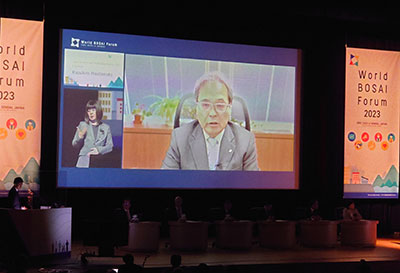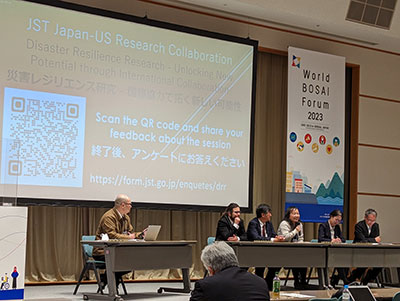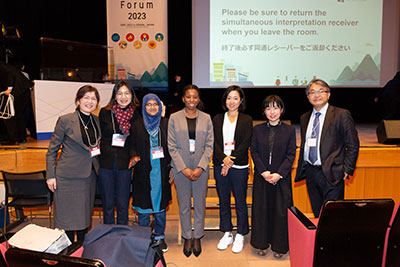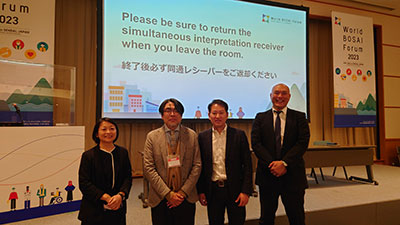News & Topics
JST held sessions at the World BOSAI Forum 2023 in Sendai
Department of International Affairs
https://www.jst.go.jp/inter/english/program_e/kiban_e/gather_e/usa.html
Research Institute of Science and Technology for Society (RISTEX)
https://www.jst.go.jp/ristex/en/index.html
Department for Promotion of Science in Society
The 3rd World BOSAI Forum 2023 / International Disaster and Risk Conference 2023 in SENDAI(hereafter called WBF)was held from March 10 to March 13, 2023, at Sendai International Center in Miyagi Prefecture, organized by the WBF Local Organizing Committee and WBF International Steering Committee. WBF began in the Tohoku region, which experienced the Great East Japan Earthquake, hoping no one would grieve over the disaster. JST participated in the forum intending to contribute to disaster prevention and mitigation through science and technology. Department of International Affairs, Research Institute of Science and Technology for Society (RISTEX), and Department for Promotion of Science in Society held the sessions.

1. Disaster Resilience Research - Unlocking New Potential through International Collaboration Research Lightning Talks and Panel Discussion
Department of International Affair held the session titled “Disaster Resilience Research - Unlocking New Potential through International Collaboration.” In the session, five researchers who have joined the collaboration program with researchers in the U.S., in the area of Human-Centered Data for Resilience Research under the framework of the Strategic International Collaborative Research Program (SICORP) since 2022, presented their research results.
In this field, JST has focused on the perspective of “disaster resilience research using human-centered data” and supported research that aims to improve resilience while deepening our understanding of human aspects, rather than the traditional approaches that emphasized the physical and engineering perspectives.

The discussion was lively and with a friendly atmosphere throughout.
Dr. Satoru Nishikawa (Nagoya University) has focused on the continuity of hospital operations required during a disaster and conducted an unprecedented study to develop business continuity plans (BCP) viewing regions centered on hospitals as a section.
Dr. Tamiyo Kondo (Kobe University) has researched land use and place-making in disaster-stricken areas in the United States and Japan and gained new insights that led to the next study through extensive fieldwork in both countries.
Dr. Mika Shimizu (Kyoto University) examined the governance framework and implementation model of “pre-disaster reconstruction,” which prepares post-disaster reconstruction before disasters occur, using a systems approach method. She held workshops with various stakeholders of both countries.
A panel discussion was held in the second half of the session. It was chaired by Mr. Kazuki Iida, a freelance journalist with extensive experience in covering and writing about disasters. Referring to each researcher’s activities and findings throughout the session, they exchanged opinions about awareness of issues rooted in the real world, including the ways of thinking about “leave no one behind” and “self-help, mutual aid, and public assistance,” questioned often in disaster prevention; the ideal top-down measures of disaster prevention; and what are the outcomes of disaster prevention research.
Above all, there were opinions that community includes people who not only originally live in a region but also came from outside; reconstruction is perceived as revamping or reconstructing; and it is also important to protect places and activities and pass over to the next generation. These views from human and social aspects are precisely what this program intended. The discussion wrapped up the session with expectations for further development of research.
Overview of the session:
https://worldbosaiforum.com/2023/en/news/detail---id-347.html
2. SCIENCE AGORA in Sendai - Women and everyday DRR
Department for Promotion of Science in Society jointly held the session titled “SCIENCE AGORA in Sendai – Women and everyday Disaster Risk Reduction (DRR)” with the International Research Institute of Disaster Science (IRIDeS), Tohoku University, and WBF Committee. This session aimed to convey the significance of disaster prevention research because women have tended to be vulnerable during disasters. After Atsushi Arakawa, Director of the department, delivered the overview of the session, five female researchers presented their activities.

(From the left to the right)Facilitator Chubachi, Paku(South Korea), Kabir(Bangladesh), Kitsepile(Zimbabwe), Yanagiya and Okusa(Japan), Arakawa(Director, JST)
Yoshie Okusa, Director of NPO natural science, has led science education activities for 17 years in Sendai.
She said that in a society where there is no single answer, cultivating decision-making and executing skills based on the scientific way of thinking can be helpful for disaster prevention.
Risa Yanagiya, an employee of Sendai City and a member of the Katahira Association for Community Building, has been involved in the memorial projects that left behind the experiences and lessons of the Great East Japan Earthquake and has worked for making disaster prevention maps and conducting drills. Through these experiences, she said that it was important for residents themselves to know the risks of their homes and communities, to create relationships in which they can help each other in times of need, and to be conveyed information appropriately.
Park Irene Jihyeon, Founder and CEO of JHSUSTAIN, a consulting firm for international development in South Korea, pointed out that under the patriarchal system, the disproportionate role of child-rearing and caregiving to women kept their disaster prevention and social skills low and increased the toll. She advocated a gender quota in policymaking and disaster prevention training.
Kabir Laila, Manager of the NGO Bangladesh Disaster Preparedness Centre (BDPC), has engaged in educational activities and training for DRR at homes, local communities, and mosques. She talked about the situation in Bangladesh where women need permission to evacuate from the head of the family, normally male, and the roles of religious leaders are critical because 98% of people are Muslims.
Ngulube Nombulelo Kitsepile(Zimbabwe), Ph.D. student, Disaster Prevention Research Institute, Kyoto University, indicated that the reason for the high rate of female casualties during disasters was due to their weak position, and in global trends, women have never been emphasized as a stakeholder in disaster management.
In the panel discussion, they talked about other attributes that tended to be vulnerable in times of disaster besides gender. Facilitator Natsuko Chubachi, Associate Professor of IRIDeS, Tohoku University, mentioned that women's issues in times of disaster are not just their issues. Through the session, we learned that thinking about why women have become victims led to a decrease in the quantum of damage caused by disasters and to the realization that ideal disaster prevention leaves no one behind.
Overview of the session:
https://worldbosaiforum.com/2023/en/news/detail---id-361.html
3. CHANCE Collaboration: the Study Group to Improve Disaster Prevention and Disaster Assistance
The initiative of “CHANCE (CHAllenge-driveN Convergence Engine): the open platform for co-designing the future,” which is a corporative initiative of JST and 17 partner organizations from academia, industry, and government, held the session titled “Leave No One Behind: Aiming for Corporate Cooperation in Disaster Relief” under the name of Study Group to Improve Disaster Prevention and Disaster Assistance, with a non-profit organization ETIC and other.
The study group is a framework of seven stakeholders aiming for “Disaster Preventions to Leave No One Behind,” including private companies, NPOs, and JST. They have held monthly workshops under the theme of “What kind of support can be provided beyond boundaries of organization in the event of a disaster.”
It has aimed to create a “collective impact” in disaster prevention utilizing each organization's knowledge and skills. From JST’s programs, Dr. Shigeo Tachiki of Doshisya University, who has worked for inclusive disaster prevention in the RISTEX program, gave a lecture.
In this forum, the organizations shared lessons and challenges from their experiences at disaster relief sites.
The key to realizing disaster relief that leaves no one behind is to further deepen peacetime ties and update disaster relief. This session was just the place for it.

(From left to right) Miwa Furuya (JST), Takuya Miura (FELISSIMO Co.), Koji Yamauchi (ETIC.), Tsuyoshi Kitayama (S-Pool, Inc.). In addition, Yoshio Kawano (Smart Supply Vision) attended remotely.
One of the unanimous topics was the diversification of support needs. For example, while most supplies delivered to the evacuation sites are basic items such as food and clothing, supporters sometimes face the reality that there are specific and individual needs such as baby bottle nipples and artificial anuses. We shared the importance of the system to bridge supporters' hope to help meet individual needs.
Another view indicated was “the administration is also a victim,” often overlooked. In the past, there were some cases in which local governments were much burdened to operate evacuation sites, because of which, there were delays or inadequate responses to situations that should be prioritized. They discussed the importance of creating a system that allowed local governments to fulfill their original roles, and outsourcing evacuation centers to private businesses were noted as an example of a solution.
Moreover, some people said that the foremost theme in the medium- to long-term range of reconstruction was the recovery of autonomy. In the process of reconstruction, there seem to arise niche demands not covered by public support from the government or social welfare councils, such as after-school care issues. The NPO side expressed a willingness to take on the role of intermediary support and coordinate these niche needs. There were expectations for academia to strengthen the ties to generalize these individual lessons. The study group aims to strengthen ties during normal times through practical activities like training and contribute to disaster prevention and mitigation.
Overview of the session:
https://worldbosaiforum.com/2023/en/news/detail---id-348.html
Other than the above, two projects from the RISTEX program “SOLVE for SDGs: Scenario Creation, Solution Creation” attended the forum and presented the results of R&D for disaster prevention and mitigation.
RISTEX Project: Development and implementation of community alert system to save the last person
Principal Investigator: Dr. Yuichi Ono, Tohoku University
Session Title: Policy proposal on international cooperation for Disaster Risk Reduction to achieve build back better: “Let us share Disaster Prevention in Japan with the world”
https://worldbosaiforum.com/2023/en/news/detail---id-383.html
RISTEX project: Research, Development and Nation-Wide Utilization of Inclusive Disaster Risk Reduction (i-BOSAI) with Professional Social Workers
Principal Investigator: Shigeo Tatsuki
Session Title: Inclusive BOSAI: Summary and evaluation of the RISTEX project
https://worldbosaiforum.com/2023/en/news/detail---id-355.html
